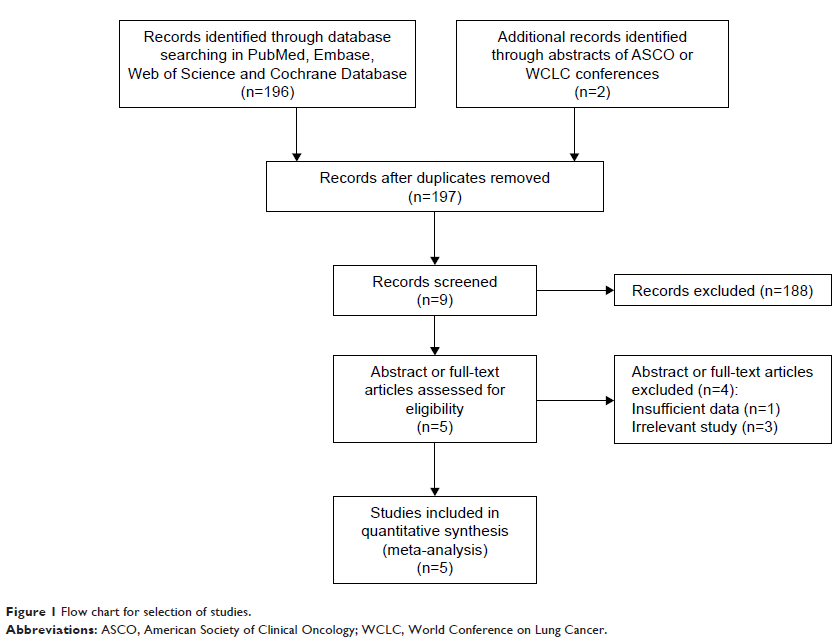108605
论文已发表
注册即可获取德孚的最新动态
IF 收录期刊
- 3.4 Breast Cancer (Dove Med Press)
- 3.2 Clin Epidemiol
- 2.6 Cancer Manag Res
- 2.9 Infect Drug Resist
- 3.7 Clin Interv Aging
- 5.1 Drug Des Dev Ther
- 3.1 Int J Chronic Obstr
- 6.6 Int J Nanomed
- 2.6 Int J Women's Health
- 2.9 Neuropsych Dis Treat
- 2.8 OncoTargets Ther
- 2.0 Patient Prefer Adher
- 2.2 Ther Clin Risk Manag
- 2.5 J Pain Res
- 3.0 Diabet Metab Synd Ob
- 3.2 Psychol Res Behav Ma
- 3.4 Nat Sci Sleep
- 1.8 Pharmgenomics Pers Med
- 2.0 Risk Manag Healthc Policy
- 4.1 J Inflamm Res
- 2.0 Int J Gen Med
- 3.4 J Hepatocell Carcinoma
- 3.0 J Asthma Allergy
- 2.2 Clin Cosmet Investig Dermatol
- 2.4 J Multidiscip Healthc

基于 EGFR-TKI 的辅助治疗与无 EGFR-TKI 的辅助治疗对切除后的非小细胞肺癌 EGFR 突变的比较:对随机对照试验的一项综合分析
Authors Wu JX, He Q, Ye F, Zhou QX, Chen HJ, Sun L, Wu H
Received 21 May 2018
Accepted for publication 3 August 2018
Published 11 October 2018 Volume 2018:11 Pages 6803—6810
DOI https://doi.org/10.2147/OTT.S174593
Checked for plagiarism Yes
Review by Single-blind
Peer reviewers approved by Dr Cristina Weinberg
Peer reviewer comments 3
Editor who approved publication: Dr Carlos E Vigil
Purpose: The great efficacy of EGFR tyrosine kinase inhibitors (EGFR-TKIs)
has been identified in patients with advanced non-small-cell lung cancer
(NSCLC) who harbor EGFR mutations. However, it has not yet been established in
postoperative adjuvant therapy.
Patients and
methods: To compare the prognosis and
toxicity of EGFR-TKI-based adjuvant therapy and non-EGFR-TKI-based adjuvant
therapy in resected NSCLC with sensitive EGFR mutations, we performed this
meta-analysis of all eligible randomized controlled trials (RCTs).
Results: A comprehensive literature search of electronic databases (from
inception to December 31, 2017) was performed. Additionally, abstracts
presented at the American Society of Clinical Oncology conferences and World
Conference on Lung Cancer held between January 2000 and November 2017 were
searched to identify relevant trials. Disease-free survival (DFS), overall survival
(OS), and grade 3 or 4 toxicities were analyzed. Five RCTs were selected, and
560 participants were included. This meta-analysis demonstrated that
EGFR-TKI-based adjuvant therapy was associated with better DFS compared with
non-EGFR-TKI-based therapy (HR =0.52, 95% CI 0.34–0.78, P =0.002). Pooled estimate has
showed the trend of superiority of EGFR-TKI-based therapy in the aspect of OS
(HR =0.65, 95% CI 0.22–1.91, P =0.43); however,
the difference was not significant. The incidence rate of grade 3–4 toxicities
of EGFR-TKI-based regimens was significantly higher for rash (OR =10.17, 95% CI
2.37–43.63, P =0.002) but lower
for vomiting (OR =0.08, 95% CI 0.01–0.61, P =0.02).
Conclusion: EGFR-TKI-based therapy was associated with better DFS compared
with non-EGFR-TKI-based adjuvant therapy in patients with NSCLC harboring EGFR
mutations. A trend was found that EGFR-TKI-based regimen improved the OS,
though the difference was not significant. Although more OS data are needed,
EGFR-TKI-based treatment has the potential to be an alternative of adjuvant
therapy for NSCLC with a sensitive EGFR mutation.
Keywords: adjuvant treatment, EGFR tyrosine kinase inhibitors,
non-small-cell lung cancer
